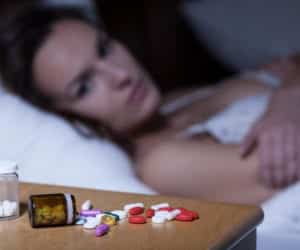Dangers of Mixing Alcohol and Sleeping Pills

Mixing Alcohol and Sleeping Pills is Never a Good Idea, and Here’s Why.
Nearly half of all Americans have experienced insomnia at some time in their lives, and up to 20 percent of the population takes sleeping pills each year. Insomnia is particularly troublesome for women–as many as 30 percent of American women say they use a prescription or over-the-counter sleep aid each week, according to the American Academy of Sleep Medicine. But sleeping pills can have negative side effects, and this is especially true when you mix alcohol and sleeping pills.
Learn more about the dangers of abusing sleeping pills here.
The Sleeping Pills Used to Manage Insomnia
- There are a variety of medications used to treat insomnia. These include:
- Benzodiazepines like Klonopin, Xanax, and Ativan are anti-anxiety medications that increase drowsiness and help people sleep. These drugs can be helpful for short-term use, but they’re addictive and have side effects like memory and attention problems.
- Non-benzodiazepine hypnotics like Ambien, Lunesta, and Sonata bind to the same receptors as benzodiazepines, but they carry a lower risk of addiction. They work quickly
- Barbiturates like Nembutal, which are rarely used to treat insomnia anymore, are central nervous system depressants that slow down your body’s systems and promote drowsiness and sleep. Barbiturates carry a high risk of fatal overdose, especially if the sleeping pills and alcohol are mixed.
- Over-the-counter sleep aids. These include products with medications like diphenhydramine (Benadryl, Aleve PM) and doxylamine succinate (Unisom).
Regardless of the type of sleep aid used, mixing sleep medication with alcohol can be dangerous or even deadly.
The Dangers of Mixing Sleeping Pills and Alcohol
Mixing alcohol and sleeping pills is always a dangerous gamble. Alcohol, like sleeping pills, is a depressant, and mixing sleep medication with alcohol can increase the sedative effects of both drugs and increase the risk of overdose. Other effects of mixing alcohol and sleeping pills include:
- Severe drowsiness.
- Dizziness and disorientation.
- Reduced motor control.
- Memory problems.
- Reduced heart rate, blood pressure, and breathing rate.
- Difficulty breathing.
- Unusual behavior.
- Vomiting.
- Coma.
- Death.
What to Do If You’re Addicted to Alcohol and Sleeping Pills
Both alcohol and sleeping pills carry a risk of addiction and dependence. Addiction is characterized by changes in the brain that lead to compulsive substance abuse despite the negative consequences it causes. Dependence is a physical need for drugs or alcohol, characterized by withdrawal symptoms that occur when you stop using.
Quitting alcohol or sleep medications cold-turkey once dependence has developed can be dangerous in itself. Withdrawal symptoms for alcohol and benzodiazepines can be fatal, and even when withdrawal isn’t dangerous, it can be extremely uncomfortable. Medical detox is the first essential step in treating any substance use disorder. Medical detox is supervised by medical and mental health professionals who administer medication to treat withdrawal symptoms and prevent dangerous complications. It improves your safety and your comfort during withdrawal.
Once the dependence is broken and brain function has begun to return to normal, a high quality treatment program will address the addiction, which is far more complex than dependence. Through a highly individualized treatment program, you’ll engage in a variety of traditional and complementary treatment therapies that address your unique needs and issues. Treatment helps people:
- Address the underlying issues of the addiction, which may include chronic stress, insomnia, trauma, or mental illness.
- Identify and change dysfunctional thought and behavior patterns that perpetuate the addiction.
- Develop coping skills for insomnia, stress, negative emotions, and other relapse triggers.
- Find purpose and meaning in life without drugs or alcohol.
- Learn how to relax, reduce stress, and have fun without drugs or alcohol.
Treatment works for most people who engage with their program. An addiction to sleeping pills or alcohol can lead to massive problems in your life, but treatment can help you solve the problems the addiction has caused and develop a substance-free lifestyle where you’re back in control of your future.
If you or a loved one needs help with abuse and/or treatment, please call the WhiteSands Treatment at (877) 855-3470. Our addiction specialists can assess your recovery needs and help you get the addiction treatment that provides the best chance for your long-term recovery.
